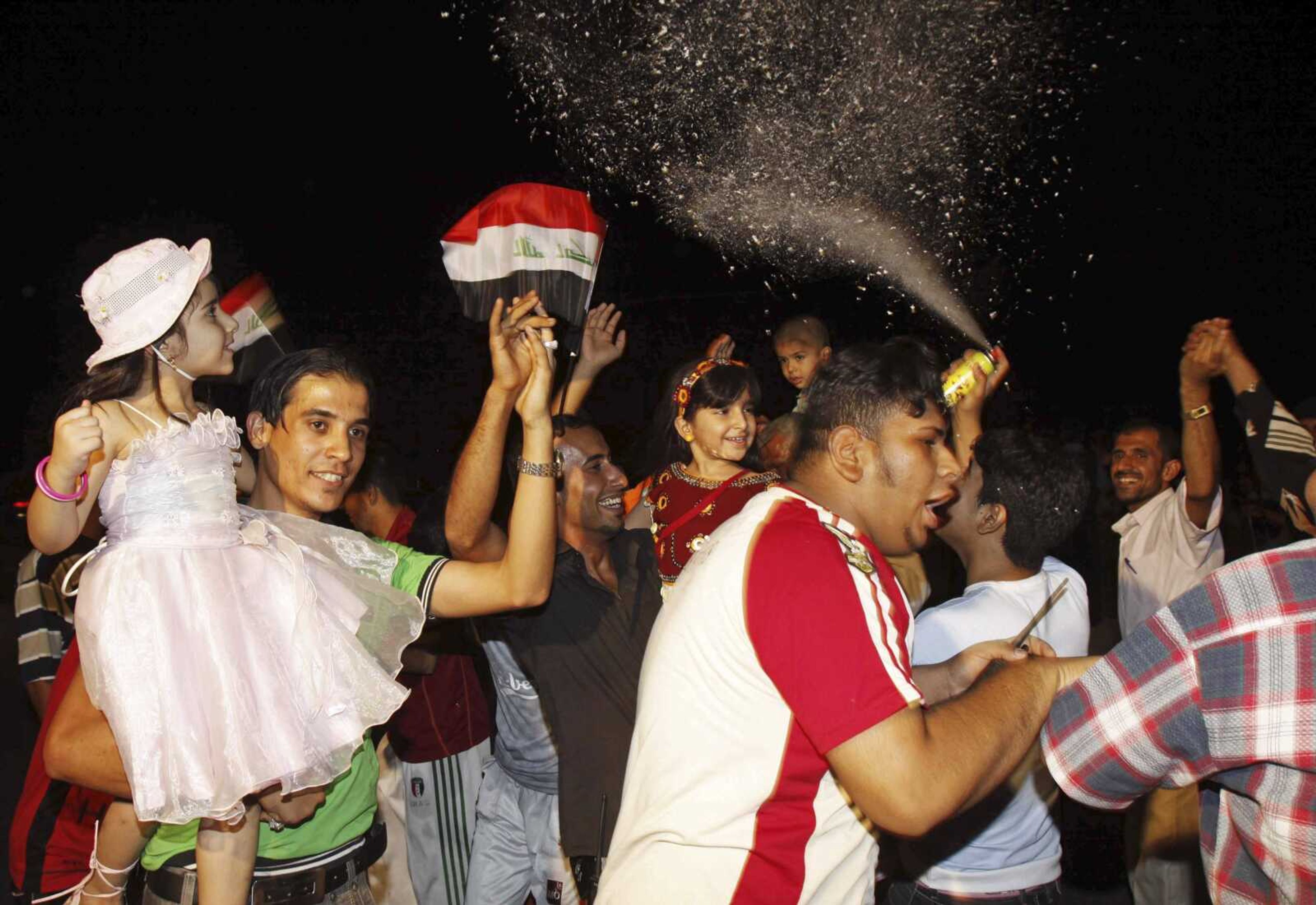Iraqis celebrate U.S. pullback, but bombing kills 33 in Kirkuk
BAGHDAD -- Not a single American soldier was in sight. Gone, too, were the American helicopters whose buzz has for years defined Baghdad's background track. Left alone to protect the capital Tuesday were thousands of Iraqi troops and police manning checkpoints, with army tanks deployed at potential trouble spots and convoys of pickup trucks with machine guns roaming the streets...
BAGHDAD -- Not a single American soldier was in sight. Gone, too, were the American helicopters whose buzz has for years defined Baghdad's background track.
Left alone to protect the capital Tuesday were thousands of Iraqi troops and police manning checkpoints, with army tanks deployed at potential trouble spots and convoys of pickup trucks with machine guns roaming the streets.
But it was elsewhere, 180 miles to the north, that militants delivered their first deadly challenge to Iraq's security forces on a symbolic day after the formal withdrawal of U.S. combat troops from cities at midnight.
A car bombing devastated a food market in the city of Kirkuk, killing at least 33 people and wounding 90. The early evening attack, which bore the hallmarks of Sunni extremist groups like al-Qaida in Iraq, was the second in the Kirkuk area since a truck bombing killed 82 people June 20.
The violence marred what otherwise was a festive occasion as Iraqis commemorated the newly declared National Sovereignty Day with military parades and marching bands in the capital.
Colorful paper balls and Iraqi flags were hoisted on blast walls at checkpoints as patriotic songs blared from loudspeakers on sidewalks.
Plastic flowers and streamers decorated police and army vehicles. One car had a red heart with the English word "Love" in the middle.
Some policemen danced atop their vehicles as they moved in convoys across the capital. Traffic was light in Baghdad, but particularly thorough searches at some checkpoints meant long lines of waiting cars in parts of the city.
No matter.
"I felt it was normal for an Iraqi soldier, rather than an American, to order me to stop for a search," said Ali Mohsen, a 30-year-old government employee from the mostly Shiite New Baghdad district. "The Americans' cowboy style was annoying," said Mohsen, recounting his car journey to his brother's home in eastern Baghdad.
"I hope our forces will be up to the task so we can return to normalcy," he said.
Iraqi authorities welcomed the U.S. pullback with nationalist rhetoric and celebrations in what appeared to be an attempt by Prime Minister Nouri al-Maliki to rally the public behind his government and secure more support ahead of an election in January.
In Washington, President Obama declared Tuesday that "Iraq's future is in the hands of its own people," warning of more violence in the days ahead but signaling optimism that Iraq will prevail as a stable, sovereign nation.
Obama predicted new flare-ups of violence, citing the bombing in Kirkuk.
"Make no mistake," Obama said, "there will be difficult days ahead."
At a news conference, Gen. Ray Odierno, the top U.S. soldier in Iraq, charged that Iran was continuing to support and train militants in Iraq who attack U.S. and Iraqi forces with rockets and roadside bombs.
"They have not stopped, and I don't think they will stop," Odierno said. "I think many of the attacks in Baghdad are from individuals that have been in fact funded or trained by the Iranians."
The U.S. pullback is a step toward the final American withdrawal from Iraq by the end of 2011, a deadline set by a U.S.-Iraqi security agreement.
A small number of the more than 130,000 U.S. troops in Iraq will remain in the cities as trainers and advisers, and the military has said it will continue to provide intelligence, air power, medical and logistical assistance to Iraq's 650,000-member security force.
U.S. troops will go back into cities on missions only if requested by the Iraqis.
U.S. military officials have been purposely vague about the size and composition of the U.S. force that will stay on in urban areas. Publicizing a number, no matter how small, could irritate some Iraqis for whom the U.S. pullback is a proud moment of national significance. And if those troops' job description sounds too much like current combat operations, it could undermine the U.S. rationale for the withdrawal.
In a video conference with Pentagon reporters Tuesday, Odierno refused to give a figure for the force staying behind. "It's going to be different every single day," based on local needs, he said.
Pressed, he said even a ballpark estimate would be inaccurate. "How many times do you want me to say that?" he said. "I don't know."
In the Baghdad news conference, Odierno said the Americans would continue combat operations coordinated with the Iraqis in rural areas and near the borders to target insurgent safe havens and disrupt foreign fighter smuggling networks.
Logistics have often been cited as among the main weaknesses of the Iraqi security forces, with a reliable fuel supply network, for example, not yet in place. Iraqi officers also complain of the time it takes to repair broken vehicles.
Privately, U.S. officers also fault the Iraqis for focusing too much on stationary checkpoints and not enough on foot patrols. They also speak of disciplinary problems and a lingering sectarian attitude among some members of the national police force, although thousands already have been fired by authorities for links to militias.
Connect with the Southeast Missourian Newsroom:
For corrections to this story or other insights for the editor, click here. To submit a letter to the editor, click here. To learn about the Southeast Missourian’s AI Policy, click here.










